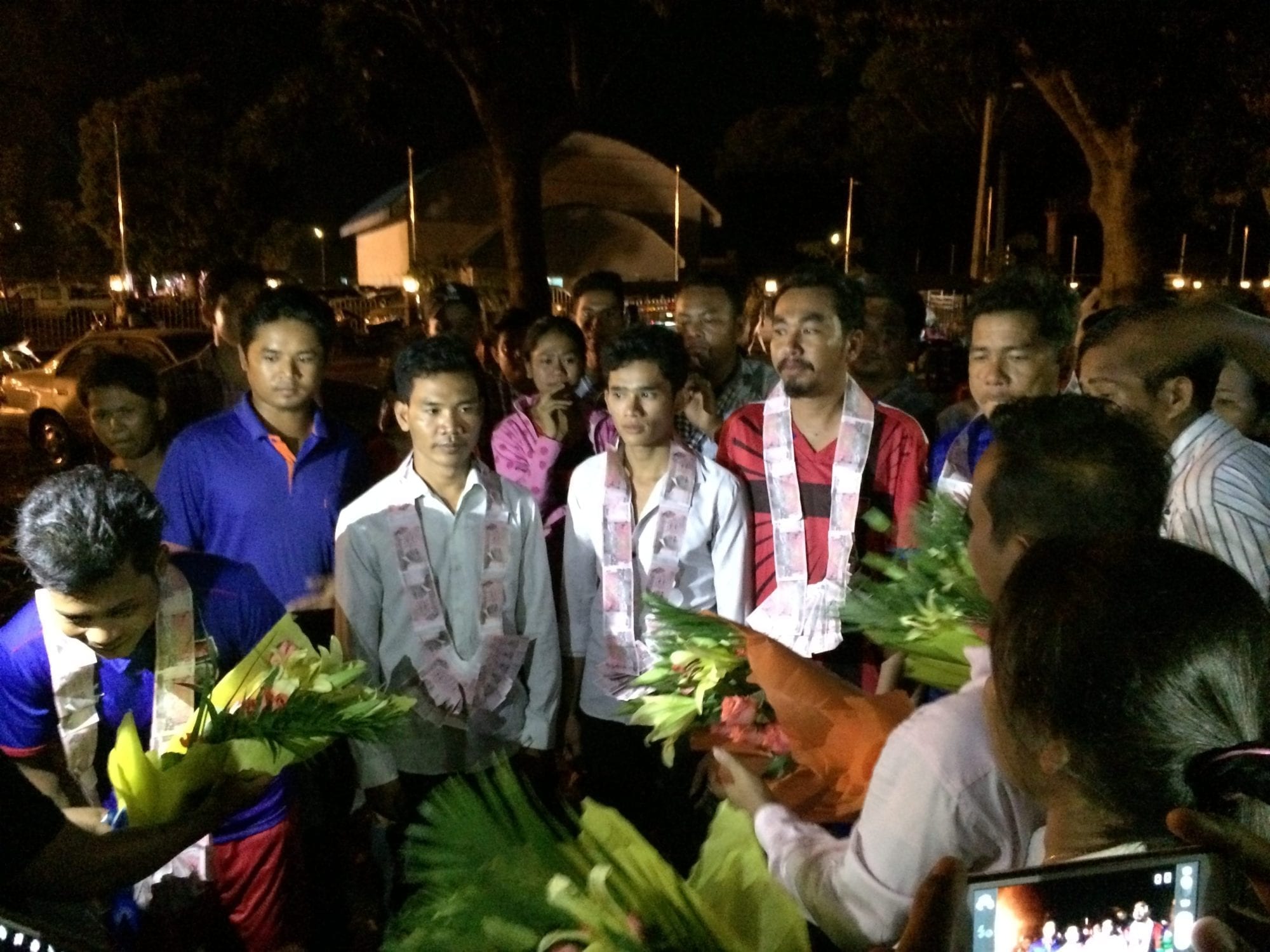
Jan 19, 2016
Five leaders of the Collective Union of Movement of Workers (CUMW) in Cambodia were released from detention today after spending nearly a week in prison for seeking to assist striking garment factory workers who sought their support. The Solidarity Center legal team in Phnom Penh was instrumental in securing the five men’s freedom.
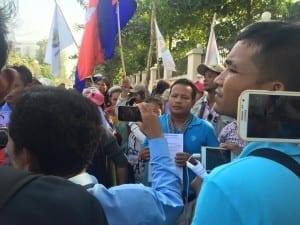
CUMW President Pav Sina said without support from the Solidarity Center, the union would have been unable to secure justice for the five organizers. Credit: Solidarity Center
Speaking at a gathering this evening to mark the release of the five union leaders, CUMW President Pav Sina said without support from the Solidarity Center, the union would have been unable to secure justice for the five organizers.
The organizers say they were beaten and arrested on January 12 when they sought to meet with the workers at the factory. Five other workers were beaten, with four suffering serious injuries to their eyes, heads and hands. The workers, who make sweaters, had sought the union’s assistance in helping them achieve workplace improvements that include lengthening work contracts from three months to a year; doubling daily pay for holiday work; and providing additional piece work pay.
At a rally in early January, the five CUMW leaders joined workers outside the factory in a solidarity rally which was disrupted when the president of the employer-controlled union ordered his group of workers to destroy CUMW materials and loud speakers. Several days later, more than 400 workers protested outside buildings housing the Prime Minister and National Assembly to further press for their rights at work and the next day, more than 500 workers gathered at the factory and at the court to demand release of the union organizers.
Short-term Contracts Make It Hard for Workers to Win Better Wages
Cambodia’s garment workers “often experience discriminatory and exploitative labor conditions” according to a Human Rights Watch report last year, which cited short-term contracts as contributing to the often abusive conditions.
“The combination of short-term contracts that make it easier to fire and control workers, poor government labor inspection and enforcement, and aggressive tactics against independent unions make it difficult for workers, the vast majority of whom are young women, to assert their rights,” the report stated.
An estimated 700,000 workers in Cambodia sew and package more than $5 billion worth of clothing, textiles and shoes every year, making up at least one-third of the country’s gross domestic product. Yet workers currently earn far less than they need to cover expenses, according to a study of garment workers and their expenditures, conducted by labor rights groups, including the Solidarity Center.
Garment workers across Cambodia have waged a series of rallies and strikes to protest low wages, most recently in October, when some 21,000 garment workers from six unions at more than 60 factories rallied for a higher minimum wage. In 2014, tens of thousands of garment workers took part in a series of mass protests demanding a living wage. At one rally, Cambodian security forces killed five workers and injured more than 60 and resulting in the arrests and dismissals of dozens of workers and union leaders.
Jan 13, 2016
At least four garment workers lost their lives yesterday and dozens more were injured when the two flat-bed trucks they were commuting to work on collided, according to Solidarity Center staff at the site of the incident. One of the trucks was carrying 50 people and the other more than 70 workers. The deaths left at least eight children without their mother.
Agence France-Presse reports that 13 of the injured workers are in critical condition.
The incident happened as the Solidarity Center’s legal team was in court overseeing disbursement of the settlement to victims and surviving families of a bus crash that killed 19 workers and injured another 20 people last spring. Families of the deceased and workers injured in the May 2015 incident attended the court session, where they received meager payments of between $1,500 and $3,000 for the loss of their loved ones or their pain and suffering. After almost a year, a number of workers who survived say they have not received compensation due them from the National Social Security Fund (NSSF).
Cambodia’s garment sector features notoriously dangerous and largely unregulated transportation for its workers, who crowd onto open-air trucks to save money. According to Women’s Wear Daily, “73 garment workers died from traffic accidents while going to work, while 789 were injured” in 2014. Meanwhile, more than 7,000 garment workers were injured and 130 killed while they were being transported to and from factories in 2015, according to the National Social Security Fund (NSSF).
“The extremely high number of fatalities and injuries is completely unacceptable,” said William Conklin, Solidarity Center Cambodia program director. “Garment workers, or any other workers, should not have to fear for their life each day on the commute to and from work. Yet they do because of the confluence of low wages and high disregard for the lives of workers on the part of authorities and factory owners. Labor here is just a commodity.”
Cambodian unions say wages are vital to safe transport for Cambodian workers, and freedom of association is crucial to collective bargaining for higher wages. Just a short distance from the site of Tuesday’s crash, workers at a sweater factory continued their strike demanding, among other things, a $3 increase in the monthly transport allowance. The response from the factory and the authorities was a violent crackdown on striking workers, arresting five and injuring about 30 people, two of them seriously.
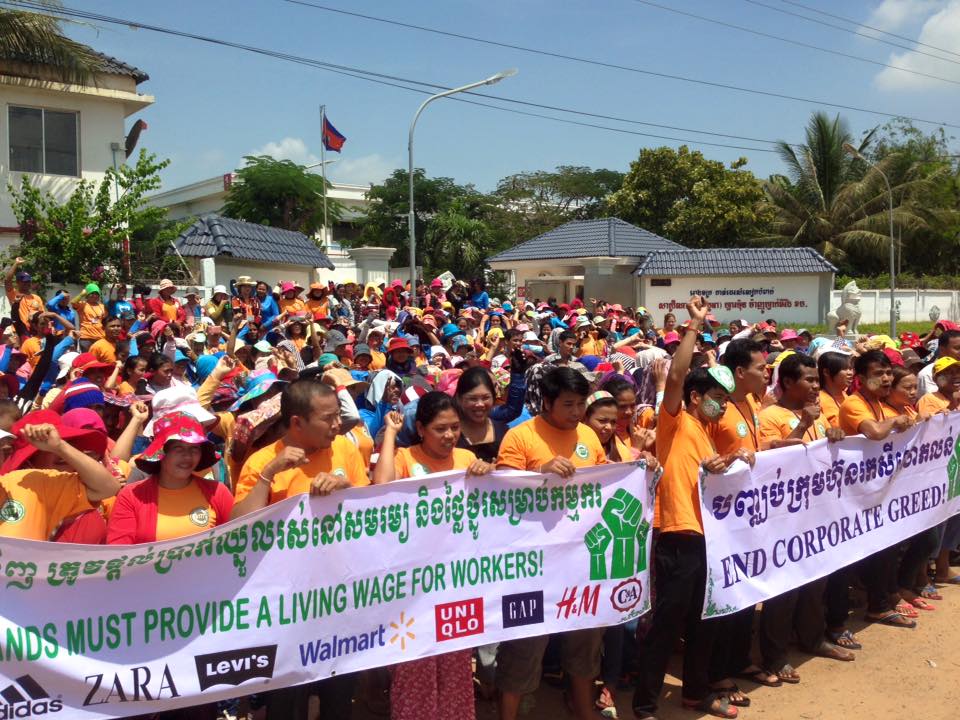
Oct 7, 2015
Some 21,000 garment workers from six unions at more than 60 factories across Cambodia dedicated their 30-minute lunch breaks to rallies calling for a higher minimum wage. The monthly minimum wage for garment and footwear workers is $128. Last year, Cambodia’s garment exports totaled $5.7 billion.
A recent study of garment workers and their expenditures, conducted by labor rights groups, including the Solidarity Center, indicates that the workers currently earn far less than they need to cover expenses.
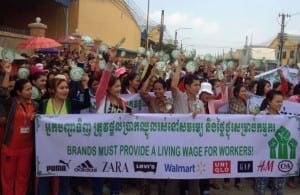
Garment workers from 60 factories around Cambodia devoted their 30-minute lunch breaks to rally on Decent Work Day. Credit: Solidarity Center/Khun Tharo
As part of the October 7 International Decent Work Day demonstrations around the theme, “End Corporate Greed,” workers from industrial areas in Phnom Penh, Sihanoukville, Kompong Spuer, Kandal and Svay Reing provinces held stickers and banners urging international brands to provide a decent living wage for Cambodian garment workers.
A working group of union representatives, employers and government officials has been meeting to determine a new 2016 minimum wage and are nearing a recommendation. The Coalition of Cambodian Apparel Workers Democratic Union (CCADWU) and other unions not affiliated with the government said that they will boycott the process if the recommendation does meet workers’ needs.
Over the past two years, tens of thousands of garment workers have taken to the streets in a series of strikes for minimum wage increases. In January 2014, Cambodian security forces shot into crowds of striking workers, killing at least five, injuring more than 60 and resulting in the arrests and dismissals of dozens of workers and union leaders.
Unions that took part in the Decent Work Day actions include the CCADWU, the Cambodian Alliance of Trade Unions, the Collective Union of Movement of Workers, the National Independent Federation of Textile Unions in Cambodia and Worker Freedom Union Federation.
The actions in Cambodia are part of worldwide activities around the world, with the International Trade Union Confederation reporting events in 33 countries at its World Day for Decent Work site.
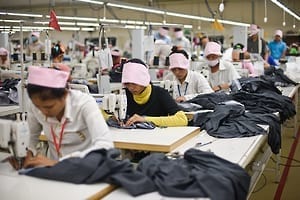
Jun 9, 2015
Cambodia’s draft trade union law would violate the right to organize and be a major step backward for workers, Human Rights Watch said yesterday in a letter to Cambodian Prime Minister Hun Sen.
The Cambodian government has told the media that the trade union law will be enacted in 2015, but has not made a draft public nor provided opportunities for feedback from workers, unions or the public.
Solidarity Center Cambodia Program Director David Welsh says he has seen the draft law, and it does not serve the interests or unions or workers.
“New labor laws and trade union laws were supposed to expand and protect the rights of workers and the freedom of trade unions, not circumscribe them in the way that this current draft law’s doing,” Welsh says. The Solidarity Center has long raised the need for a new trade union law that is grounded in strong worker protections based on internationally accepted standards.
“If the government doesn’t change track, it will be extremely damaging going forward for the reputation of Cambodia as an investment country, and as a viable garment sector as well.”
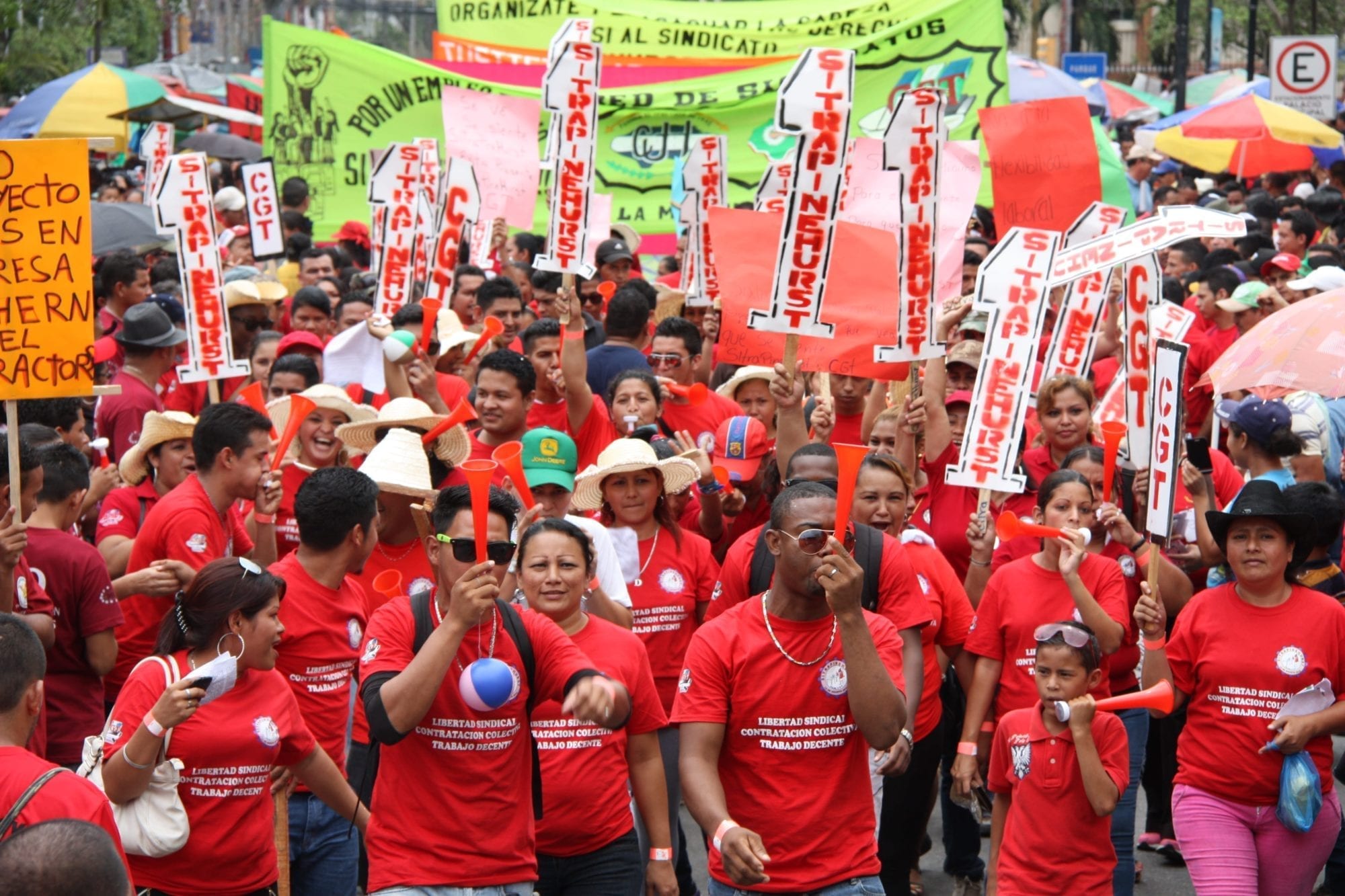
May 5, 2015
Hundreds of thousands of workers and their unions around the world marked International Workers Day May 1. For many, the day provided a time to push for living wages and safe workplaces. Yet this year, governments in some countries like Bahrain and Swaziland banned May Day celebrations or threatened workers with retaliation if they turned out—and some brave workers defied these edicts to exercise their freedom to gather in public spaces.
Elsewhere, workers like those in Bangladesh who often are prevented from forming unions or exercising their fundamental worker rights, called for the freedom to join unions and correct workplace injustices.
Sumi Begum, 25, a Bangladeshi garment worker, says that she and other workers at her factory have not received salaries or overtime pay for the past two months, but they cannot raise the issue with the manager because they fear they would be terminated if they did so.
“Garment factories that have union are not facing these kinds of problems,” she says. “The condition of those garment industries is much better than ours.”
[portfolio_slideshow id=4427]






